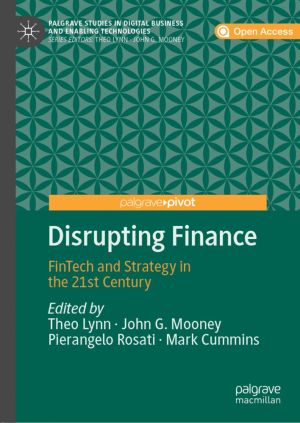Disrupting Finance
FinTech and Strategy in the 21st Century
by Theo Lynn, John G. Mooney, Pierangelo Rosati, Mark Cummins
DescriptionTable of ContentsDetailsHashtagsReport an issue 






Book Description
This open access Pivot demonstrates how a variety of technologies act as innovation catalysts within the banking and financial services sector. Traditional banks and financial services are under increasing competition from global IT companies such as Google, Apple, Amazon and PayPal whilst facing pressure from investors to reduce costs, increase agility and improve customer retention. Technologies such as blockchain, cloud computing, mobile technologies, big data analytics and social media therefore have perhaps more potential in this industry and area of business than any other. This book defines a fintech ecosystem for the 21st century, providing a state-of-the art review of current literature, suggesting avenues for new research and offering perspectives from business, technology and industry.This open book is licensed under a Creative Commons License (CC BY-NC-ND). You can download Disrupting Finance ebook for free in PDF format (2.7 MB).
Table of Contents
Chapter 1
Deciphering Crowdfunding
Chapter 2
Addressing Information Asymmetries in Online Peer-to-Peer Lending
Chapter 3
Machine Learning and AI for Risk Management
Chapter 4
What FinTech Can Learn from High-Frequency Trading: Economic Consequences, Open Issues and Future of Corporate Disclosure
Chapter 5
InsurTech
Chapter 6
Understanding RegTech for Digital Regulatory Compliance
Chapter 7
Payment Service Directive II and Its Implications
Chapter 8
From Transactions to Interactions: Social Considerations for Digital Money
Chapter 9
Token-Based Business Models
Chapter 10
Blockchain Beyond Cryptocurrencies
Index
171
Book Details
Title
Disrupting Finance
Subject
Business and Management
Publisher
Palgrave Pivot
Published
2019
Pages
175
Edition
1
Language
English
ISBN13
9783030023294
ISBN10
303002329X
ISBN13 Digital
9783030023300
ISBN10 Digital
3030023303
PDF Size
2.7 MB
License

Related Books

This book reflects the current state of discussion about agricultural and rural finance in developing and transition countries. It provides insight into specific themes, such as commodity value chains, farm banking, risk management in agricultural banking, structured finance, crop insurance, mobile banking, and how to increase effectiveness in rura...

Given the manifold challenges of financial sectors in developing and transition countries, one might be tempted to believe that embarking on "green" finance is not a priority for financial systems development. However, there are a number of arguments against this view. Environmental finance, particularly energy efficiency and renewable en...

Principles of Finance is targeted at the core finance course for undergraduate business majors. The book is designed for conceptual accessibility to students who are relatively early in their business curriculum, yet it is also suitable for more advanced students. Due to the wide range of audiences and course approaches, the book is designed to be ...

This book focuses on the achievements, current trends and further potential of microfinance to scale-up and serve many more clients with financial services that enable them to improve their living conditions. The book asks what it takes to achieve sustainable impact: to know your clients and to understand their needs, to treat them in a fair and tr...

This book seeks to foster a multidisciplinary understanding of the ties between faith, financial intermediation, and economic progress by drawing on research across economics, finance, history, philosophy, ethics, theology, public policy, law, and other disciplines. Chapters in this edited volume examine themes as consequential as economic opportun...

In recent years, the European Commission has attached increasing importance to the use of financial engineering instruments rather than traditional grant-based financing for the microcredit sector, considering these to be the most efficient option available.
This book presents a study of capacity building and structural funds in public managing au...

